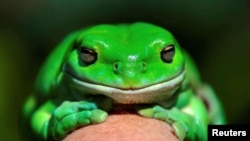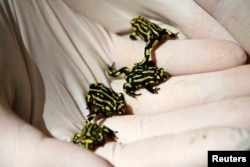An Australian museum has teamed up with computer giant International Business Machines to count the country's native frog population, and they want amphibian enthusiasts to jump on board.
The Australian Museum and IBM say they developed the world's first smartphone app especially designed to let users record and report frog calls, croaks and chirps — without disturbing them.
Australia has 240 named native species of frog, and the museum wants to use its FrogID app to identify what it believes are dozens more still ribbiting under the radar.
"One of the cool things about this is you can survey frogs just by listening," said Jodi Rowley, the museum's curator of amphibian and reptile conservation biology.
"It's actually a lot more accurate than photos, and photos encourage people to handle or disturb frogs," Rowley added. She noted that every frog species has a unique call.
While frog populations are in decline around the world, Australia's frogs are especially vulnerable because of a combination of climate change, pollution, introduced species and urban development, the country's Department of Environment and Energy says.
According to the Environment Protection and Biodiversity Conservation Act four frog varieties are extinct, five are critically endangered, 14 are endangered and a further 10 are considered vulnerable.
Scientists say the presence of frogs in an ecosystem is a sign of good environmental health, but the small amphibians are highly sensitive to changes in their habitat.
Rowley said she hopes campers, hikers and other serious nature lovers will help with the research, but she noted that even the humble backyard fishpond could provide valuable data.
"It might allow us to figure out which areas of suburbia are really good for frogs, why they are good and hopefully help create more frog friendly habitats in suburbia," she said.
Rowley said amateurs who record previously unknown frog calls may even help discover a new type of frog or determine if any introduced species have gone unnoticed.
"All these things will help us — and help Australia — make sure that frogs don't croak," she said.






